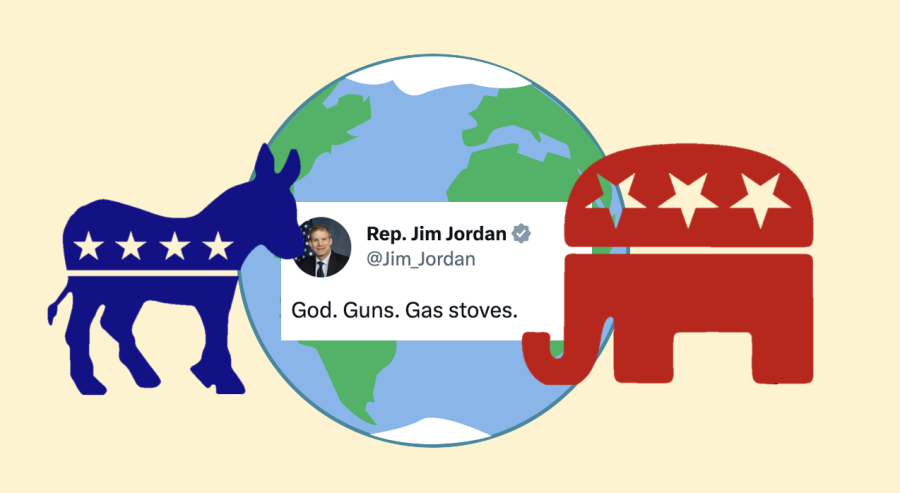How Culture Wars Infiltrate our Climate Conversations
You probably remember when gas stoves had their moment as a hot topic on social media in January of this year. Maybe you’re still following the development and environmental impacts of household appliances. But if you’re like any average social media user, you probably saw the moment come and go. Research and comments from the Consumer Product Safety Commission (CPSC) about the health dangers posed by gas stoves—including asthma—ignited a debate about their environmental impact: gas stoves can leak methane into homes and likely into the surrounding environment. As the idea of a potential gas stove ban—which was nowhere near close to happening—worried certain communities, politicians had their say on the issue.
Representative Jim Jordan of Ohio tweeted “God. Guns. Gas Stoves.” on January 11th. Governor of Florida, Ron DeSantis, added an apron to his merchandise storefront which reads “Don’t tread on Florida” and resembles the yellow “Don’t Tread on Me” flag of 1775 — except it replaces the rattlesnake symbol with a sketch of a gas stove.
Heated dialogue about gas stoves has crept back into news coverage and social media recently as a potential ban is working through the New York State legislature. Representative Jim Jordan again had a response to this, once again tweeting to call out Democrats.
Normally, I wouldn’t pay too much attention to Jordan’s Twitter account; he exhibits intentionally inflaming rhetoric on social media. But the dialogue during January on Twitter and other sites exhibited tense energy across the board. A straightforward concern, in my eyes, over asthma and methane emissions, was twisted into some proposed gas stove ban that would be an infringement upon rights resemblant of 1984. In reality, a ban was never actually suggested at that point.
All this commotion is reflective of a bigger, concerning phenomenon: the politicization of sustainability and general polarization around environmental topics. We’ve seen this before when plastic straws were a heated topic in climate conversations. I recall my friends and family’s complaints over soggy paper straws. Plastic straws even received national coverage, and you may have seen a few tweets expressing annoyance over the switch away from plastic. Limiting the use of plastic straws, of course, might be a small remedy for a large-scale problem, but the amount of criticism and debate around the idea of such a simple, sustainable change is, nevertheless, a bit shocking. Throughout various online moments, we’ve seen conversations around sustainability become a left versus right, old versus young, or ‘woke’ versus conservative conversation.
Shouldn’t everyone care about the planet?
I’m not saying these conversations aren’t important, or that controversy is all that surprising. I’m glad we’re having a dialogue about what actions individuals can take to live more sustainable lives (investing in electric stoves if it’s affordable, switching to metal straws, etc.). And I’m glad that we’re acknowledging the complexity of these conversations. I know it’s inconceivable for everyone to join hands and save the Earth; environmental issues carry weight due to complexity when it comes to policy and environmental justice. But when we engage in inflaming rhetoric on social media — when we get to the point where raising concern over gas stoves sounds a freedom alarm for certain politicians — I have to wonder: are we putting too much emphasis on individual actions?
When we hyperfocus on things like gas stoves, it becomes hard to have a productive conversation about the environment. Instead of nonpartisan discussions to find solutions, we have political squabbling. Rhetoric like Jordan’s equates being sustainable to a political statement as if caring about the climate is a new form of virtue signaling. When we see politically-tinged rhetoric about sustainability issues, it becomes clear that we’re letting the environment become a new front in America’s culture wars. Allowing climate conversations to turn into unproductive debates where the participants are more concerned about proving their political and ideological purity gets us nowhere in the effort to save the planet.
Making it a political — or generally bold — statement to be sustainable can turn people away from sustainability, which is why heated dialogue becomes so concerning. In 2019, if I were to advocate for metal straws, I’d probably get questioned about their “inconvenience” rather than their environmental benefit. Today, If I were to raise my concern over gas stoves, I’d likely be accused of participating in the woke war against gas stoves and of, somehow, attacking your freedom. Environmental-focused conversations don’t have to be heated or political. Instead, productive dialogue about environmental issues can invite more people to learn more about the environment and participate in these dialogues.
Conversations about things like gas stoves or single-use plastic are important to have, but they represent only a fraction of the discussions we need to be having about the climate crisis. It’s disappointing when we devote so much of our energy to just a few environmental issues. It’s also disappointing that heated discussions — overshadowed by culture wars — will only grow the American partisan divide over climate change.

Rylee Hatch is a sophomore from East Fishkill, NY concentrating in English and environmental studies. She has previously served as a staff writer for the...










